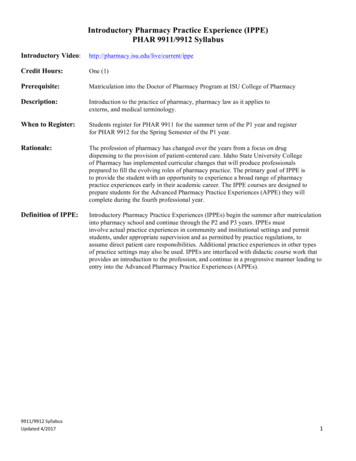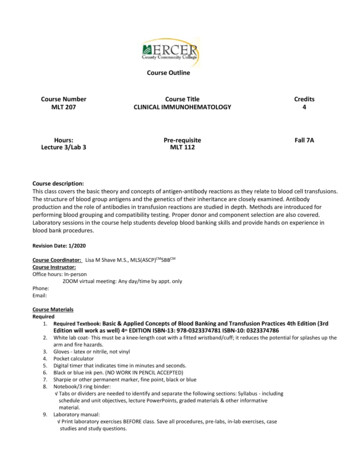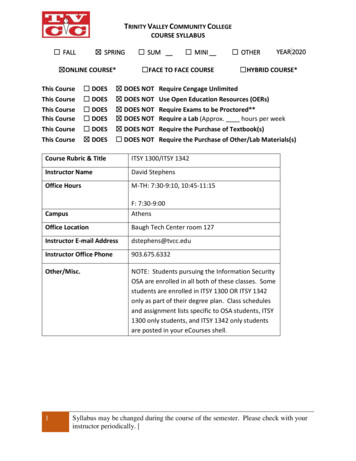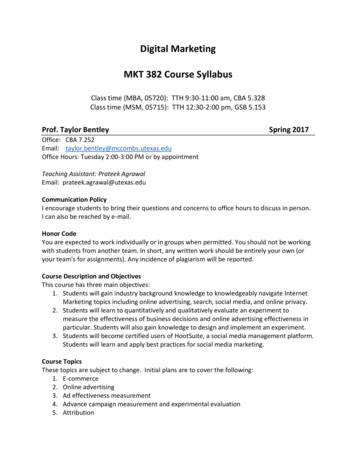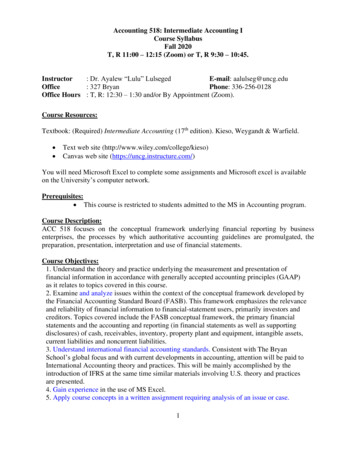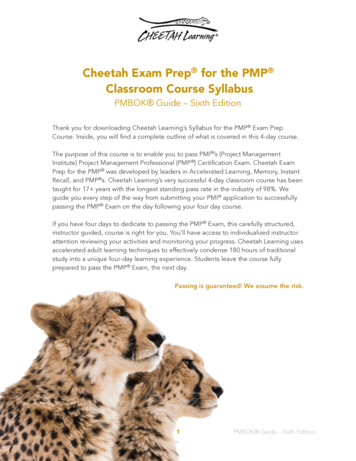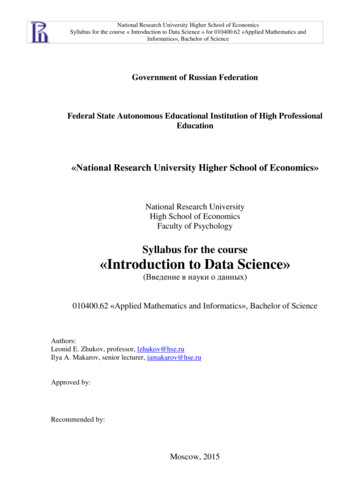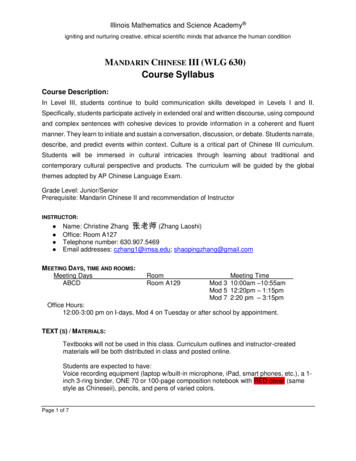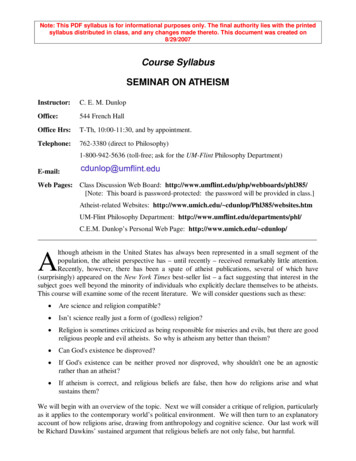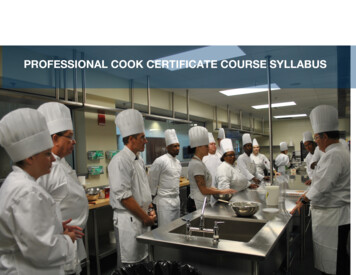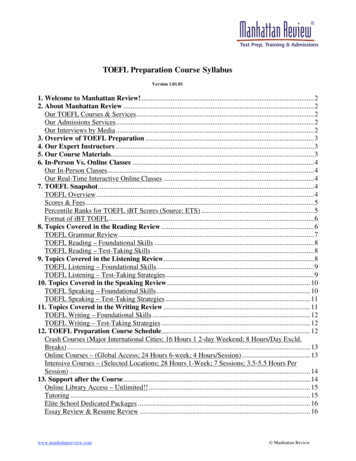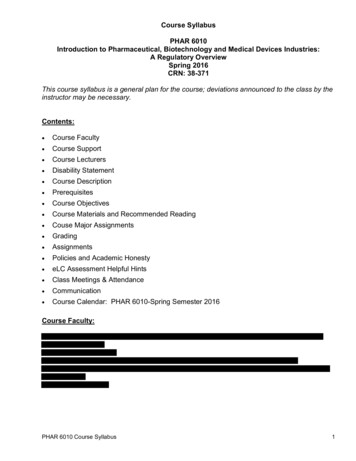
Transcription
Course SyllabusPHAR 6010Introduction to Pharmaceutical, Biotechnology and Medical Devices Industries:A Regulatory OverviewSpring 2016CRN: 38-371This course syllabus is a general plan for the course; deviations announced to the class by theinstructor may be necessary.Contents: Course Faculty Course Support Course Lecturers Disability Statement Course Description Prerequisites Course Objectives Course Materials and Recommended Reading Couse Major Assignments Grading Assignments Policies and Academic Honesty eLC Assessment Helpful Hints Class Meetings & Attendance Communication Course Calendar: PHAR 6010-Spring Semester 2016Course Faculty:PHAR 6010 Course Syllabus1
Course Support:When emailing faculty and staff, please allow a reply time of 24-48 hours. If you submit aquestion over the weekend, please allow additional response time. For assignment grades tobe returned, please allow at least 72-business hours.Course Lecturers:David W. Mullis, Jr., Ph.D., RAC, FRAPSDirector, BioPharma Regulatory Affairs Graduate Education ProgramCollege of PharmacyUniversity of GeorgiaJoann Pittman & ColleagueSpecial Assistant, Southeast RegionFood and Drug Administration, Atlanta, GAFelipe Dolz, DVM, PhDHead, Global Regulatory Affairs,MerialKristen Kilgos, DVMGlobal Head, PharmacovigilanceMerial Limited, a Sanofi CompanyGrace Gowda, Ph.D., RACHead of Government and Strategic Affairs (GSA),Global Regulatory Affairs, R&DMerial Limited, a Sanofi Company.Wayne Wiley, R.Ph.Senior Director, Regulatory AffairsRecro Pharma, Inc.PHAR 6010 Course Syllabus2
Disability Statement:The University of Georgia Regulatory Affairs Program is committed to providing reasonableaccess and accommodations for people with disabilities upon request.If you have a disability and require reasonable accommodations, please contact the instructorby phone, email or an appointment during office hours.If you plan to request accommodations, please also consider registering with the DisabilityResource Center.Disability Resource Center, Division of Student AffairsThe University of Georgia, 114 Clark Howell Hall, Athens, GA 30602-3338(706)542-8719 (voice); (706)542-7719 (fax); (706)542-8778 (tty);email: pbertot@uga.edu and URL: http://drc.uga.edu/UGA Gwinnett Campus Representative is Laura Crawley, Ph.D., 678-985-6805,email: lcrawley@uga.eduCourse Description:PHAR 6010 is one of the core courses required for the Regulatory Affairs and Clinical Trialscertificate programs and for the Master of Science Degree in Pharmacy with an emphasis inRegulatory Affairs. This course provides an introduction to the pharmaceutical, biotechnology,medical devices and animal health industries. The primary goal of this course is to provide thefoundational information to allow a student to develop a basic knowledge and understanding ofthe pharmaceutical, biotechnology and medical devices industries from a regulatory affairsperspective.Students will need this course content information to support further study and to perform thetasks required of Regulatory Affairs and Clinical Trials management professionals. The coursewill provide an overview of company organizations, product development andcommercialization activities with an emphasis on regulatory requirements.Prerequisites: Permission of DepartmentCourse Objectives:Upon completion of PHAR 6010, students will be able to demonstrate:1) An understanding of the product development process, including: Describing various approaches to product development Discussing the interrelationships among the different functional or departments involvedin the product development process Summarizing the impact of the regulatory process on the product development process2) An understanding of the Food and Drug Administration, including: A history of key regulations The development and evolution of the FDA regulatory process The FDA organization and functional componentsPHAR 6010 Course Syllabus3
Interactions between and among FDA CentersThe principles and general approaches required to obtain FDA clearance to market newproductsHow to use selected FDA reference documents and websites3) An understanding of the basic operational differences and similarities of pharmaceutical,biotechnology, medical device and animal health companies including: Impact on the economy Effect of globalization on various industries4) The ability to locate reference materials required by individuals working as regulatory affairsor clinical trials management professionals.5) An appreciation for the subjective and interpretative aspects of regulations and the ability tothink critically about the interaction between regulatory applications and productdevelopment.Course Materials and Recommended Reading:Readings: There is no required textbook for this course. The readings will come from abibliography list and many of these will be available from the internet or library. Typically, theinstructor will provide a recommended reading list on a weekly basis.Materials: A variety of materials and methods will be employed in providing the information forPHAR 6010. These may include audio lectures, PowerPoint presentations, reading materialsand interactive exercises.TIME: All times are listed in Eastern Time Zone. If you live outside of the Eastern Time Zone,please adjust accordingly.Couse Major Assignments:IMPORTANT for ALL CLASSES:As Regulatory Affairs or Clinical Trials professionals and as UGA graduate students, thisprogram expects that each assignment is submitted as though you were submitting this task toyour Board of Directors, FDA or other managing body. With this in mind, when you submit aresearch paper or written assignment, be sure that you follow the assignment directions; useyour computer’s spell checking feature to assure that there are no misspellings; and proof-readyour document for typographical errors. Finally, be sure that you cite all references for thoseideas and quotes that are not your own.Assignments should be submitted through the eLC Dropbox tool. Research papers and writingassignments should be in a word processing format that can be read by Microsoft Word (.doc,.docx). If warranted, you will also receive your assignment back, with inserted comments, asan attachment. Proper file extensions must be used on all files to ensure that your work can beviewed and evaluated. Work that cannot be viewed will be considered as not turned in, ormissing.PHAR 6010 Course Syllabus4
1) Autobiographical SummaryPlease write a brief autobiographical summary to share with your class and faculty. Someareas to include might be as follow: Current employer.Describe your role or position.How did you achieve your current position (significant assignments, schooling, etc.)?What interests you most about the regulatory affairs or clinical trials field?List your professional goals, both short and longer term.Share other personal information about interests, hobbies, etc.This autobiographical summary should be submitted on or before Sunday, January 17,2016 by 11:59 p.m. through the eLC Assignment Dropbox and posted in the eLCDiscussion area.2) Major Research Project: Company ProfileYou are to choose a company in the pharmaceutical, biologics, biotech or medical devicesindustry that interests you. Please choose a company that is in a different field from which youare presently employed. In order to prevent duplicate student presentations. Please notifyby e-mail on or before January 31, 2016 with thename of the company you have chosen for your project.You are to conduct an in-depth study of that company’s background, marketplace position,research and development approach and regulatory history. Your research will typically involvesearching the company’s website for general information about the company, reviewing annualreports, and contacting the company directly to arrange a brief interview with someone like theVP/Director of Research and Development, Director of New Product Development and/orDirector of Marketing. You may also try to communicate with the head of Regulatory Affairs togain insight into how the company interacts with FDA and other regulatory agencies.You will submit a written report on the chosen company to include the following information: History of the company - how long in business, private or public and major productsmarketed.Technology platform of product(s) - drugs, biologics, vaccines, cells, devices.Company’s state of development - e.g., research only, marketing products or fullyvertically integrated.Describe the company’s product development plan or approach to creating newproducts - how new products are screened, reviewed and approved internally.How the company accomplish each of the key tasks:o Discovery (chemistry, engineering, pharmacology)o Preclinical research (scope and how it is performed)o Regulatory Pathways (IND, IDE, NDA, PMA, BLA)o Clinical research overview (what tasks are handled internally and what arecontracted to outside firms or CROs)Provide a summary of the products that the company currently has marketed.Regulatory Profile:PHAR 6010 Course Syllabus5
Review and summarize information pertaining to FDA interactions with the companythat are available in the public domain. This should include reviewing the FDA websitesfor possible product approvals over the past two to three years, warning letters,establishment inspections reports including FDA Form 483s and/or product recalls.Recommendations:Using what you have learned in this course, please provide recommendation for howthe company could positively impact or improve its product development process andregulatory approach for bringing new products to the US marketplace.Your paper should be double spaced, 12-point font, and 10-15 pages in length excludingtables, graphs, pictures and references.REFERENCE CITATIONS - Remember to properly document any referenced materials,including company websites, the FDA website, books, articles, quotes, etc. Failure to citereferenced works or materials is considered a violation of UGA’s Culture of Honesty Policy andcould result in failure from this course. The style we recommend is the AMA style (TheAmerican Medical Association). It covers medicine, health, and biological sciences. Examplesare available at: tion.htmPapers and Presentations turned in without references lists or bibliographies areunacceptable. It will be considered a violation of UGA’s Culture of Honesty Policy toturn in a research project without noting your sources and you may receive a failinggrade for the course.Your Final Project Parts (and logistics)As a supplement to your paper, you will create and record a presentation highlighting yourchosen company and paper. You will record your presentation using the eLC/BlackboardCollaborate Classroom system. Separate instructions for using this system will be sent earlyon in the semester. Each student presentation should be no more than 25 minutes in length.You should deliver your presentation as though you were presenting to your professionalcolleagues or to your company’s board.Recording instructions:As a graduate student and as a working professional, it is important to remind you that youshould not wait until the last minute to address your course recording assignment. Eachstudent is responsible for creating a functioning recording as a part of thisassignment. This recording is due on the due date noted in the course syllabus. Noextensions will be granted. It is your responsibility to ensure that your equipment workswith the Blackboard system. Following the Blackboard Collaborate directions to the letter,you are to ensure your presentation has no glitches that impact negatively your message. Assuch, you should not wait until the last minute to create your recording. You should familiarizeyourself with the Blackboard Collaborate technology early in the course. You should provideyourself ample time for a few practice sessions of your presentation. Review those sessionsand ensure that slides advance and your voice is audible. This means you should review yourarchived material. Should you have questions or encounter technical difficulties during thistime, alert your course support person.PHAR 6010 Course Syllabus6
She may be able to schedule time to assist or guide you through the process. However, if youwait until the last minute, you run the risk of not getting assistance. If the recording is due onDecember 6th at 11:59 pm, for example, do not wait until December 6th noon to accessBlackboard Collaborate for the first time. Last minute emails or phone calls, particularly overweekends, requesting help, are likely to go unanswered.Following the recording of the student presentations, you will pick 2 of yourclassmates’ presentation to review. Using the threaded discussion tool, you willdiscuss these presentations based on some specific questions that will be posted in thediscussion area.Final Project Summary (4 parts)1. eLC Assignment Dropbox: Your research paper is due on or before Monday April 25,2016 by 11:59 p.m. via eLC Assignment Dropbox.2. eLC Dropbox Tool: Your PowerPoint presentation is due on or before ThursdayApril 28, 2016 by 11:59 p.m. via eLC Assignment Dropbox.3. eLC Blackboard Classroom Tool: Your Presentation Recording is due Saturday April30, 2016 by 11:59 p.m.4. eLC Threaded Discussion Tool: Your threaded discussions on classmatepresentations is due on or before Monday May 2, 2016 by 11:59 pm.Connectivity ExpectationsAs UGA students, you are provided with a UGA MyID account giving you access to e-mail andeLearning Commons, and other services. It is your responsibility to make sure your MyIDaccount and password is active. All of your course materials will appear in eLC. We will useeLC to make announcements pertaining to this course. It is your responsibility to check youreLC News and Content Modules on a regular basis to make sure you keep current with thecourseRemember, we are a PC-based program. If you use an Apple Computer to develop yourpresentation, it is YOUR responsibility to ensure that your presentation is visible to youraudience. You can do this by preparing a PC-formatted version of your presentation. Or, youcan use your Apple Laptop to deliver your presentation. If you do this, YOU will need toensure that you have the appropriate cables and apparatus to project your presentation. Ouroffice does not support the Apple environment.3) Web ExercisesDuring most weeks of the course, you will be required to complete web exercises that involvesearching for and reviewing materials on the FDA web site. The goal of these exercises is tohelp you become familiar with references available on the web and to help you learn somesearch tools/techniques when faced with new product issues. Some of these exercises mayinclude brief essays that require you to synthesize, interpret or draw conclusions about thematerials that you have been reading and receiving during class sessions.PHAR 6010 Course Syllabus7
Grading: Grading will be based on the following scale:100-point scale Grade100-94A93-90A89-88B 87-84B83-80B79-78C 77-74C73-70C69-60D59 FTable 1: Grading ScaleGrading will be based on each student completing special assignments that are made duringthe course including web exercises, discussion boards and quizzes, as applicable, and a majorproject: Company Profile plus its presentation to the class. The following provides weightingfor each activity: Online/Class Participation (Web Exercises and Quizzes)Written Paper on Company ProfilePowerPointPresentation of Paper to Class & Threaded Discussions50%30%10%10%100%Assignments: All assignments and papers MUST BE submitted using the eLC Assignmenttools. This is mandatory. This is the only way to officially track your work. Email yourassignment ONLY if you receive special permission, but you must then follow up with asubmission via eLC. Take care also to submit the assignment to the correct submission tool.If you are late turning in your assignment, and can no longer submit your assignment, contactthe course support person before emailing your assignment.Final course grades are noted in eLC (unofficial) and the ATHENA (official) system.Policies and Academic Honesty:All academic work must meet the standards contained in A Culture of Honesty. Each student isresponsible to inform him or herself about those standards before performing any academicwork. A Culture of Honesty is the University of Georgia's policy and procedures for handlingcases of suspected dishonesty and can be found online at www.uga.edu/honesty. UGAStudent Honor Code states "I will be academically honest in all of my academic work and willnot tolerate academic dishonesty of others." Be sure to review the section in eLC on AcademicHonesty.Prohibited conduct includes “submitting for academic advancement an item of academic workthat has been submitted (even when submitted previously by that student) for credit in anothercourse, unless done pursuant to authorization from the instructor supervising the work orcontaining fair attribution to the original work.” Therefore, you may not submit substantiallyPHAR 6010 Course Syllabus8
similar assignments for credit in other courses unless you receive the instructor’s permission torework that assignment.From the Instructor: All students are responsible for knowing the University’s policy onacademic honesty. All academic work submitted in this course must be your own unlessyou have received my permission to collaborate and have properly acknowledgedreceiving assistance. It is my responsibility to uphold the University’s academic honestypolicy and to report my belief of dishonesty to the Office of the Vice President forInstruction.Missed Assignments/Quizzes: You will have a specific length of time to take an onlineAssessment as well as deadlines to turn in Assignments. Absences or failure to turn in anAssignment or Assessment by the deadline will result in a failing grade for the respective testunless there is a bona fide emergency involving the student or an immediate family member.If such a case occurs, the student must contact the UGA Regulatory Affairs GraduateEducation Program as soon as possible at (678) 985-6810 or email amakkar@uga.edu.Netiquette:In this course, and all the courses in the program, you will be required to interact with studentsand faculty electronically, either through email or eLC Discussion Boards or Chat Rooms.Please follow these simple guidelines of network etiquette.1. Please always be respectful of classmates’ opinions and ideas. If you disagree on a topic,do so respectfully and with tact. These discussions are monitored by faculty and often yourgrade will depend on your participation and the quality and content of your posting. Shouldyou be disrespectful, this may impact your grade.2. Do not post anything off-topic in the designated discussion, email or chat topic areas. Ineach course, there will be a section referred to as the “Coffee Shop” for off-topicdiscussions. This discussion area is for topics related to Regulatory Affairs, but may not bedirectly related to your specific course. At no point are you to use any class emailaddresses, distribution lists or eLC programs for soliciting.3. Take care when using humor or sarcasm in emails, discussions and chats. Humor andsarcasm are often hard to convey electronically. It is safest to avoid using it; but if youchose to add humor, consider using emoticons like , , .eLC Assessment Helpful Hints:Assessments (quizzes) will be posted in the related Learning Module and the Assessmentssections of eLC. See each Assessment link for exact submission deadlines. Be sure to "SaveAnswer" for each question before submitting. Do not use your browser's navigation buttonswhile using the Assessment module. If you lose your connection or close your browser, your"saved answers" will be saved until the next time you open the Assessment.Class Meetings
UGA Gwinnett Campus Representative is Laura Crawley, Ph.D., 678-985-6805, email: lcrawley@uga.edu Course Description: PHAR 6010 is one of the core courses required for the Regulatory Affairs and Clinical Trials certificate programs and for the Master of Science Degree in
